How to Accept Bitcoin Payments
If you click to purchase a product or service based on our independent recommendations and impartial reviews, we may receive a commission. Learn more
You can accept Bitcoin payments online through the use of apps and plugins on a number of website builders and ecommerce sites like Wix, Squarespace, and Shopify.
Accepting Bitcoin as a small business gives your customers more options for how they pay and could lead to significant financial gain for your future (you could even start buying and selling websites). On the flipside, it could also alienate some customers and does come with a degree of financial risk.
The world of Bitcoin and cryptocurrency is a confusing one, built on advanced computer terminology. But we here at Website Builder Guide have not only done the research, we’ve also collected quotes from others who have made the plunge into Bitcoin.
Read their stories below, or just follow our helpful guide to get the full lowdown on everything Bitcoin, so you can make the right decision for your online business!
What Is Bitcoin?
You may be asking what Bitcoin is, how it works, and whether Crypto isn’t the name of Superman’s dog. Maybe you heard about it from a colleague, an uncle, or at a BBQ – or even from this year’s SuperBowl ads?

Many guides and advice for beginners online tend to skim over a lot of the details. The success of Bitcoin and other cryptocurrency is dependent on its uptake. For those who have a significant stake, the less you know the better!
Here at Website Builder Guide, we reject this outlook. We believe in fully researched and unbiased guides that serve you in making the right choice.
Where Did Bitcoin Come From?
Bitcoin is a digital currency invented in 2009. “Satoshi Nakamoto” is the man responsible, though he never officially confirmed his identity (and may not even exist!).
After witnessing the financial crisis the year before, Satoshi allegedly wanted a currency that was not beholden to any global bank or market – in other words, a fully decentralized banking system.
How Does It Work?
Bitcoin and cryptocurrencies operate on a very technical level – you almost need a degree in Computer Science to understand it all!
All cryptocurrencies need “Blocks” in order to work. These blocks are actually digital ledgers, the raw data of over 500 online transactions.

These ledgers then get linked to others in a great chain – a “blockchain.” The blockchain provides an irrefutable timeline of all transactions.
What makes Bitcoin and cryptocurrencies special is that they operate on a peer-to-peer computer network. Actual people need to be present in order for a transaction to happen. These extraordinary individuals are known as miners. Without them, the entire crypto environment would collapse.
You see, when a transaction happens it is encrypted immediately, meaning it’s essentially locked in a puzzle. This protects the transaction from hackers (and puts the “crypto” in “cryptocurrency”). A miner must then try to solve (decrypt) the puzzle. If they are the first one to decrypt it they get to add the block to the chain, and are rewarded some Bitcoin for doing so.
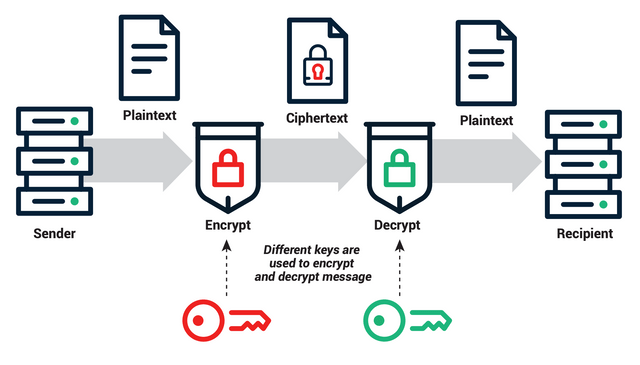
Starting to make sense now? We know this a lot to take in, but we want you to have at least a basic understanding of Bitcoin before you add it to your online business.
How Is Bitcoin Regulated?
Bitcoin is actually regulated, despite its open-source roots. The number of Bitcoin is capped at 21 million. This ensures that its value as a currency can continue to rise.
Don’t worry if you think this means you’ve missed the boat. Current estimates say that the Bitcoin cap will only be reached by 2140 (maybe tell your great-grandkids, though!).
Another regulation that Bitcoin enforces is halving. Every four years, the rate of Bitcoin per solved block gets halved. In 2009, a miner got 50 Bitcoin for solving a block. Now, they get 6.25. This ensures that the work involved with mining reflects the price. After all, a single Bitcoin (at time of writing) is worth $40,407.60!
How To Accept Bitcoin Payments
#1. Choose a Crypto Merchant
More and more website builders and ecommerce sites are offering Bitcoin payments online. If you are already using any of the following:
- Wix
- Squarespace
- WordPress
- WooCommerce
- Shopify
- Magento
Then we have collected the best options and integrations they’re currently offering. Check them out below!
If You Like This:
If you want to know more about these website builders and ecommerce sites, you can read other articles on our site here:#1. Blockonomics

Blockonomics is one of the most popular and reliable crypto merchants on the market. It offers integration with a number of the top website builder and ecommerce brands, such as Wix, Squarespace, WordPress, and Shopify.
Some of the great features it offers include:
- Easy-to-follow video guides for how to integrate it into your online store
- Clear and comprehensive support section
- Bitcoin Pay Buttons added to store
- Wallet Watcher feature to keep track of all transactions
- Peer-2-Peer invoicing so you can make invoices directly in-wallet
Pricing
Blockonomics has a merchants fee of 1%. For example, if you get paid 0.025BTC, Blockonomics will subtract 0.0025BTC from your wallet.
However, Blockonomics offers the first 20 transactions free of charge, allowing you to change your mind if you’re unhappy with its service.

Who Is It Best For?
As of today, Blockonomics only deals in Bitcoin and Bitcoin Cash. Additionally, you’ll need a crypto wallet with some Bitcoin already there in order to activate the service. For more information about crypto wallets, skip to the dedicated section.
We definitely recommend Blockonomics for new or smaller online businesses due to its ease of access and simplicity. It just does the job!
We talked to real people who had gotten involved in Bitcoin and cryptocurrency over the past few years to hear their experiences...
An overall better understanding of its impact on society and the best strategy to take to combat risk. I had a pretty good understanding from the people around me but doing my own research was trying as it’s either gate-kept or extremely confusing if you are not from an economist background. Crypto for dummies is what I needed.
#2. BitPay
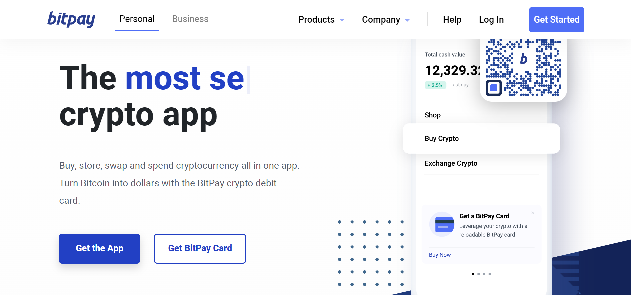
BitPay is the leader when it comes to professional crypto services. It’s a one-stop shop for all things Bitcoin, offering wallets, debit cards, a mobile app and (of course!) accepting Bitcoin payments for your business!
BitPay is available via app plugin on Wix, Shopify, WooCommerce, and Magento.
BitPay’s best features include:
- A large range of cryptos to trade in, such as DogeCoin, Ethereum, and LiteCoin
- Locked-in conversion rates
- Great ease of use and tech support
- Supporting apps like BitPay Checkout, allowing you to manage your Bitcoin payments from Apple or Android devices
Pricing
BitPay offers a 1% transaction fee, the same as other services. However, for Bitcoin trading BitPay will charge a miners fee as well as a network fee. These are just a small percentage, but they can add up on bigger transactions if the network is busy.
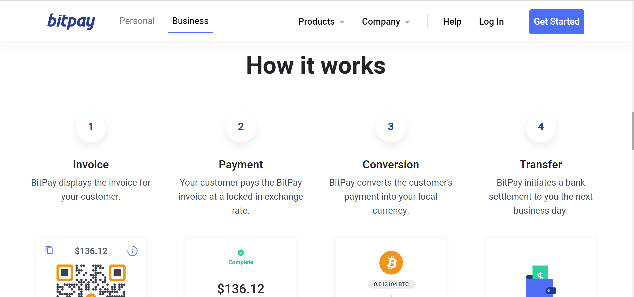
Who Is It Best For?
BitPay is a great choice if you’re looking for something simple and easy, and don’t mind paying a little extra for the convenience. If you want everything taken care of by one service provider, BitPay is definitely worth a look!
#3. BTCPay Server
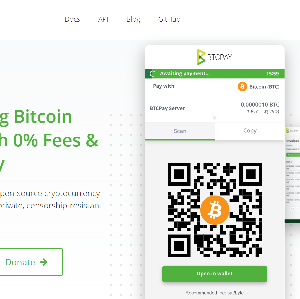
Available as a plug-in for WooCommerce, Shopify, and Magento, BTCPay Server is the only completely free merchant on this list. It differs from other similar plugins by being more of a tool than a service. BTCPay Server describes itself as “code, not a company.”
It features:
- No fees or subscriptions. It’s totally free!
- No middleman lenders or services. The payments occur between you and your customers
- Helpful how-to guides so you can implement it with ease
- Total control of how it operates – for better or worse
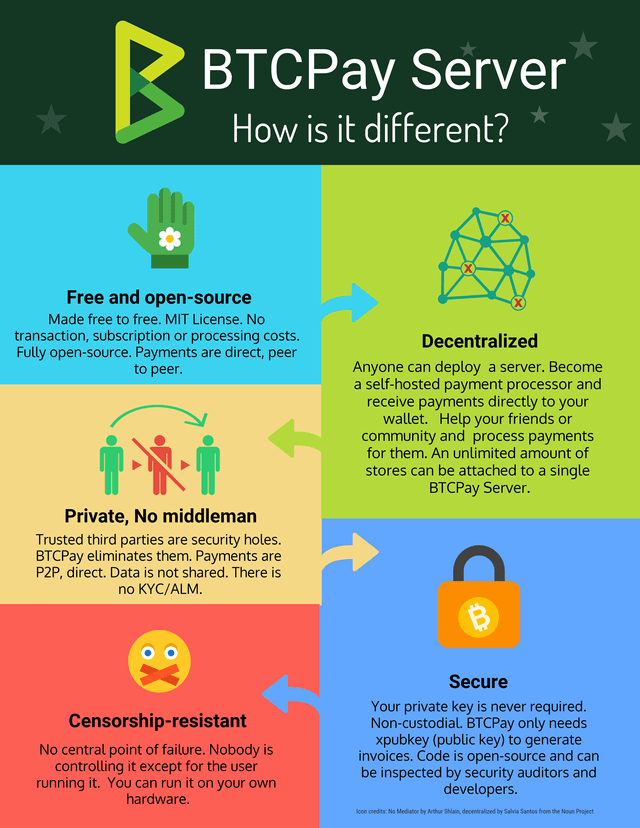
Who Is It Best For?
BTCPay Server is the least user-friendly service on this list. You’ll have to manually set up a wallet, buy Bitcoin, organize the sale, and so forth.
Additionally, there is no fiat exchange available on the platform, meaning you will have to find another way to convert all your Bitcoin back into dollars.
We recommend BTCPay Server if you already have a seriously good grasp of how cryptocurrency works and want the unlimited freedom BTCPay Server provides (if you don’t mind the extra work).
More Information
- How to Make Money in the Metaverse: 15 top tips from our experts
#2. Integrate Your Chosen Crypto Merchant With Your Store
Once you have chosen your merchant, it’s time to integrate it with your website!
- Head to your chosen merchant’s website.
- Find the integration for your particular ecommerce builder. Look out for an “Accept Payments” link.
- Follow the instructions given on the page.
Voilà! Your online store should now be able to accept Bitcoin!
Top Tip!
If you’re building using WordPress, you will likely need to go into the plugin library to find the merchant you need.#3. How To Spend Your Bitcoin Earnings
We’ve explained how to accept online Bitcoin payments. But now the question is what to do with them! Good news, though – there are a number of options available.
Pickings used to be slim when it came to spending Bitcoin. Thankfully, things have changed and now many companies have stepped in to make it easier than ever for you to spend your Bitcoin!
Here are two methods for spending your hard-earned Bitcoin:
Wallets
Wallets are fundamental to crypto. They basically act as your key to the crypto house, allowing you to trade, buy and keep track of your cryptocurrencies.
You don’t actually store Bitcoins or any cryptocurrencies in the wallet, however. What you get instead is an address to the transaction’s position in the blockchain. By giving someone your personal address, or you receiving theirs, they can state they’re giving you their Bitcoin, just like any other financial transaction.
You will most likely need a wallet if you want to accept Bitcoin payments. It’s an industry standard. Many are available as mobile apps, allowing you to check your wallets on the go!
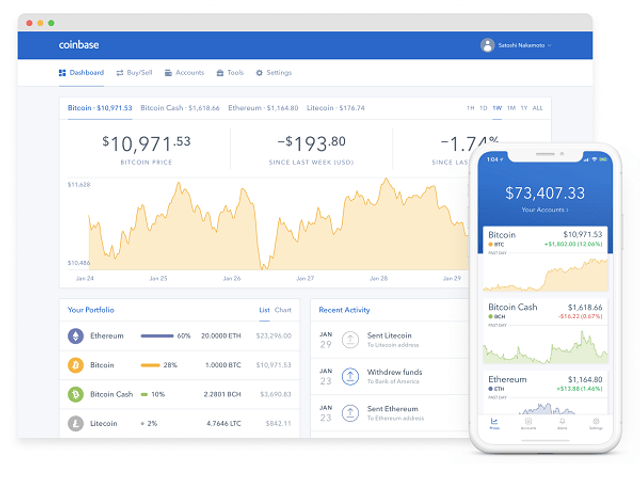
Here’s our quick list wallets for you to get started:
- Coinbase Wallet – Best for Beginners
- Electrum – Best for Bitcoin
- BitPay – Good All-rounder
Crypto Debit Cards
Taking things a step further, Crypto Debit Cards allow those with wallets to spend their cryptocurrencies with online or in-person purchases, as well as take money out of ATMs.
It works exactly like a normal debit card, except using your crypto wallet as the account. Neat!
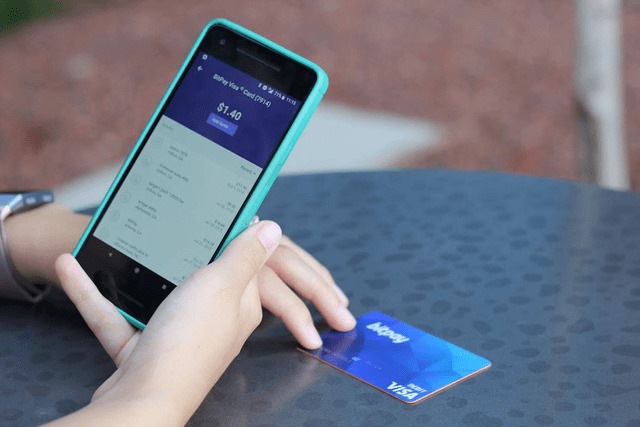
BitPay offers a card through its service. There are no transaction fees or subscriptions to pay, but there are the usual miner and network fees. Additionally, there is a $2.50USD liquidation charge for taking out of an ATM.
Should I Use Bitcoin?
We’ve spoken about what Bitcoin is and how you can accept payments online, but now we should pause and consider what the pros and cons of getting involved are.Bitcoin and cryptocurrencies can incur significant financial risk if you are not fully informed. We want to make sure you understand everything before making a decision to jump in.
The Benefits of Using Bitcoin
Customer Choice
In regards to your image as an online business owner, the major benefit of allowing online Bitcoin payments is that you give your customers more choice. More payment options have been shown to boost sales.
ROI
However, most people getting into Bitcoin and cryptocurrency do so because of the massive returns that are possible due to its market nature.
And it is true! Bitcoin’s value against the US Dollar fluctuates much more dynamically than any other currency on Earth! Over 2017 it rose from $974 to $20,000 – a gain of 1,950%! Remember Satoshi Nakamura, the inventor of Bitcoin? He has an estimated 750,000–110,000,000 Bitcoins. Today, that would be valued at $75 billion, making him the 15th richest person in the world!
We talked to real people who had gotten involved in Bitcoin and cryptocurrency over the past few years to hear their experiences...
Wanted to earn some additional money outside of my wages, and crypto was a way for me to diversify my portfolio.
As the value goes up and more people see the fiscal results, it will be hard to ignore the surge of energy Bitcoin and crypto are experiencing.
The Negatives of Bitcoin (and Cryptocurrency in General)
Financial Risk
For all the money you can theoretically make, you can lose it too. Bitcoin is essentially a stock market, with traders selling and buying but at an accelerated rate. Many first-time uptakers lament not having a more in-depth understanding of the economics beforehand.
We talked to real people who had gotten involved in Bitcoin and cryptocurrency over the past decade to hear their experiences…
I wish I had put the time into learning the basic coding knowledge I required to be able to obtain a wallet and buy my first bitcoin; like a lot of others, that original investment could have been worth a lot of money today and that concept of FOMO (fear of missing out) drives a lot of the crypto market now, helping to push prices up on projects that have no real use other than to make money quick. On top of this, I wish I had more of a knowledge of stock market fundamentals, as when I did start trading I had to learn fast or risk losing capital. A base knowledge would have helped me get a leg up in an emerging market that was less correlated to the S&P 500 than it is now.
In fact, many crypto-enthusiasts bank on this volatility to make themselves rich at the expense of others.
Infamous “pump and dump” scams made headlines in 2021 as traders artificially inflated certain cryptocurrencies only to quickly sell them all off – making off with nearly $3 million in the process! These golden-toothed investors still prowl the internet, looking to make a quick buck, so be careful and make sure you do all your research before committing to a new coin.
Environmental Risk
Lastly, there is a moral complication to cryptocurrency.
Mining takes a lot of electricity. A lot. You need hundreds of computers working at maximum capacity in order to solve the tricky puzzles the blocks are contained in.

These so-called “mining farms” use an obscene amount of electricity. It was estimated that crypto miners collectively use 121.4 terawatt-hours of electricity a year to power their farms. That’s enough to power the entire country of Ireland for a year! Five times!
It should be no surprise to you that this has a devastating effect on our environment, exacerbating the effects of climate change.
When governments around the world are trying their best to reduce energy usage and stop our reliance on fossil fuels, it can seem quite selfish for crypto miners to knowingly make the situation worse through their activities.
Summary
Accepting Bitcoin payments can seem like a big step. After all, it’s a whole new technology – a whole new currency, even. That’s why we’ve laid out the options available, so that you can feel more comfortable in making a decision.
Blockonomics is our pick for the best way to accept Bitcoin payments. It’s simple to use, non-committal, and makes the whole process feel a lot less daunting. BitPay is a great choice if you’re looking for convenience, since it has everything you could possibly need to know and use for crypto in one place.


Leave a comment